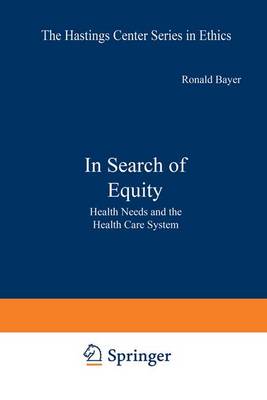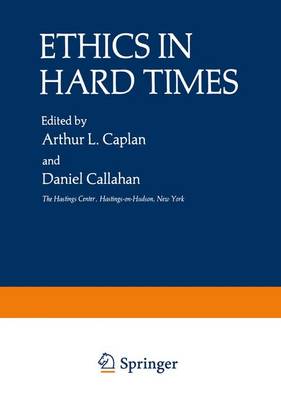The Hastings Center Series in Ethics
2 total works
I Several years ago, when the Carter administration announced that it would support congressional action to end the public fund- ing of abortions, the President was asked at a press conference whether he thought that such a policy was unfair; he responded, "Life is unfair." His remarks provoked a storm of controversy. For other than those who, for principled reasons, opposed abor- tion on any grounds, it seemed that the President's comments were cruel, violating what was thought to be an American com- mitment to providing equal access to health services to all citi- zens, regardless of their capacity to pay. Those sentiments had, in fact, been reflected in public opinion polls that had, for at least three decades, indicated that Americans supported the propo- sition that the government should guarantee health care to all. Ultimately, those beliefs had been translated into the oft-ex- 1 pressed political demand for a one-class system of health care. This commitment to equality is rather remarkable. American society evidences a striking willingness to tolerate vast inequal- ities with regard to income and wealth.
While it guarantees ed- ucation to all children, there is not even a pretense that the children of the wealthy and the children of the poor ought to get precisely the same kind of schooling. While some commitment 'Hazel Erskine. "The Polls: Health Insurance," Public Opinion Quarterly, XXXIX (Spring, 1975), 128-143.
While it guarantees ed- ucation to all children, there is not even a pretense that the children of the wealthy and the children of the poor ought to get precisely the same kind of schooling. While some commitment 'Hazel Erskine. "The Polls: Health Insurance," Public Opinion Quarterly, XXXIX (Spring, 1975), 128-143.
There is widespread agreement among large segments of western society that we are living in a period of hard times. At first glance such a belief might seem exceedingly odd. After all, persons in western society find themselves living in a time of unprecedented material abundance. Hunger and disease, evils all too familiar to the members of earlier generations, although far from eradicated from modern life, are plainly on the wane. Persons alive today can look forward to healthier, longer, and more comfortable lives than those of their grand- parents. Nevertheless, the feeling that life today is especially difficult is rampant in government, in the media, in popular books, and in academic circles. Western society is perceived in many quarters as wracked by crises of all sorts-of faith, of power, of authority, of social turmoil, of declining quality in workmanship and products, and of a general intellectual malaise afflicting both those on the Left and the Right. A tone of crisis permeates the language of public life.
Editorials in major newspapers are full of dire warnings about the dangers of unbridled egoism, avarice and greed, and the risks and horrors of pollution, overpopulation, the arms race, crime, and indulgent lifestyles.
Editorials in major newspapers are full of dire warnings about the dangers of unbridled egoism, avarice and greed, and the risks and horrors of pollution, overpopulation, the arms race, crime, and indulgent lifestyles.

